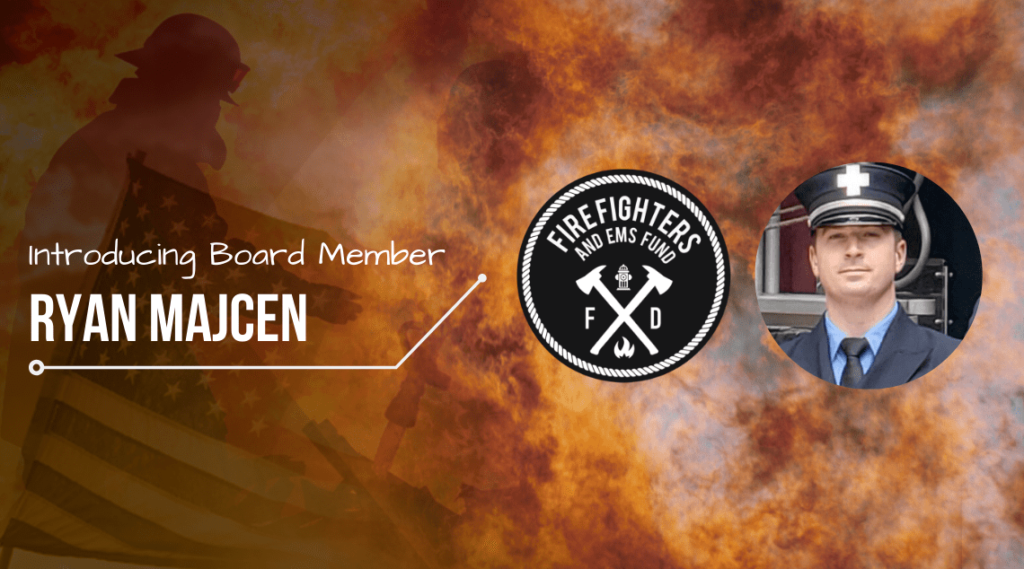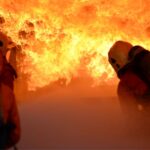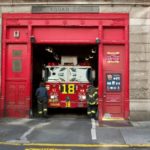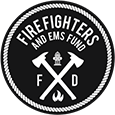As the Executive Director of Firefighters and EMS Fund I am excited to introduce our newest board member. I recently sat down with Ryan Majcen to talk about his life and experiences that make him a great member of the team. Here’s what he had to say:
Q: Who are you and where are you from?
A: “My name is Ryan Majcen. I was born and raised in Wisconsin and I currently live in Madison.”
Q: How long have you been a firefighter?
A: “I’ve been a firefighter for around 12 years. I was originally a firefighter in the navy and after I got out I was brought in as a paid on call firefighter in Kaukauna.”
Q: What made you want to pursue a career in public service in general, and firefighting specifically?
A: “Overall I think it boiled down to my junior year of high school when 9/11 happened. I knew I wanted to serve my country. My father had been a police officer and I knew when I got out of the military public service was my calling. When firefighter/ems services are called out to a scene, we are there to provide after the scene has been secured, the critical step of providing quality pre-hospital care is what brings me the most satisfaction. “
Q: What is your average day look like?
A: “Every day varies from one to the other but what is guaranteed to happen is we will train, respond to emergency calls, and strive to increase our skills, knowledge and public awareness about safety.”
Q: How does firefighting differ from other EMR (Emergency Medical Responder) careers?
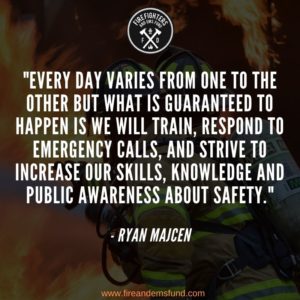
A: “This varies from department to department. Some localities have fire and EMS combined, while others don’t. Some places train in all fields with a program that introduces candidates to all areas of public safety. “
Q: What are the different roles in a firefighting crew?
A: “Well, each place has its own vocabulary. The lieutenant oversees the scene. The engineer or driver maintains the engine and drives the crew to the scene. The Senior firefighter takes the primary attack line to the door while the junior firefighter, in this case, would be responsible for the plug or hooking the hydrant. “
Q: What positions have you worked?
A: “I’m trained to act as the engineer in the event that someone else cannot. However my primary position is riding backwards or simply put, being a firefighter on the engine crew. “
Q: What is the most rewarding thing about being a professional firefighter?
A: “I would have to say the most rewarding thing is that someone will call you on their worst day and they 100% depend on you. We as a team are there to make the situation better or solve the problem altogether. You get a strong sense of satisfaction after doing something good for someone else.”
Q: What is the most challenging thing about being a professional firefighter?
A: “This varies from person to person. For me the most challenging thing is being proficient in as many things as possible. You often have to go from A-Z in your mind very quickly. From breathing issues a person might be experiencing, to knowledge of atrocities, and back to something like a stroke. There is a lot of information a modern firefighter needs to have on hand.”
Q: What do your family and friends think about your decision to continue public service?
A: “They are really proud of what I do. They really take pride in having someone in their family who wears a uniform in the public safety world and who is held to a different standard. Yes, they worry but they know I have been adequately trained and as brothers and sisters we look out for each other. “
Q: Is there anything you want others who may be pursuing a career in firefighting to know in order to be successful?
A: “I would repeat what was repeated to me quite often. This isn’t a fly by night job. Just worry about doing a good job and standing apart from the pack. You need to have the right mindset and stick with it. Show patience and dedication and you will get there. “
Q: Where do you see yourself in five years? Are you pursuing a leadership position in your department?
A: “Personally I see my family growing and becoming a bigger part of my community here in Madison. Professionally I see myself in the fire service, continuing to educate myself and improving my skills so that I will be ready for a promotion if the opportunity arises.”
Q: What are some things the public doesn’t realize about the average firefighter?
A: “A lot of people don’t realize we are at the station for 24 hours and once a shift is over we go straight home to take care of our families. Most firefighters are very sleep deprived and it’s a problem that needs to be addressed. Many firefighters are also EMTs. I get questioned a lot why the fire truck shows up for Medical calls. Well, we can’t all fit in the ambulance! Firefighters pay for their own meals! Every day we make a pool of our personal money and go grocery shopping when we find the time.”
In another interview, Executive Director Nile Porter sat down with volunteer firefighter and Firefighters and EMS Fund board member, Kyle Johns, to get his take on the job and the most pressing issues in the industry. Read the interview here.

